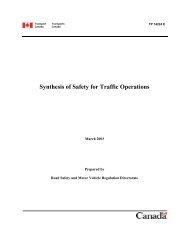District II Quebec City-Les Escoumins - Transports Canada
District II Quebec City-Les Escoumins - Transports Canada
District II Quebec City-Les Escoumins - Transports Canada
You also want an ePaper? Increase the reach of your titles
YUMPU automatically turns print PDFs into web optimized ePapers that Google loves.
3.2 Approach and learning strategies<br />
Skill-based training program<br />
This is a skill-based training program. These skills have been identified using a work<br />
environment analysis that considers various job factors and the context and draws on the<br />
experience of senior officers. An objective and standard have been assigned to each skill to be<br />
mastered. These skills have been incorporated into a training plan aimed at preparing candidates<br />
for certification. Organizing the skills by system makes it possible to move smoothly from one<br />
objective to the next, avoiding pointless repetition and promoting absorption of the material.<br />
Recommended adult training approach<br />
Since this program is intended for adults with varying academic backgrounds and levels of<br />
work experience, the adult education approach has been used to develop teaching and learning<br />
strategies. This approach takes into account how adults function in a learning situation and the<br />
working context in which they exercise their profession.<br />
Preparatory training for certification of officers takes place in three compulsory basic modules<br />
over a ten-week session. Preferably, these modules should each be taken in a single session.<br />
Practical training sessions in the simulator and on the river may vary according to the candidate’s<br />
ability. A job-related diagnostic test will be administered before training starts. It will enable the<br />
instructor and candidate to determine what has already been learned and to target skills to be<br />
developed for certification. The optional modules will be offered at times and under conditions<br />
set by the training institution.<br />
The introductory module is the cornerstone: it sets the parameters for a safe environment where<br />
experimentation is valued and interaction with colleagues is encouraged. It enables candidates<br />
to make the connection between the program, the job, and the skills to be developed, in order to<br />
learn the ways of the organization. Shipping accidents can be used to initiate a discussion and<br />
generate interest in the training program. Finally, the module will explain certain notions relating<br />
to learning strategies to facilitate the memorization of local knowledge.<br />
Complementary learning methods are highly recommended to ensure adequate preparation and<br />
meshing with candidates’ availability. We will alternate between self-learning, classroom work,<br />
simulator sessions, and shipboard training. For example, much local knowledge might be gained<br />
in the classroom while learning to prepare a passage plan, followed by a period of self-learning<br />
with a tutorial. After this, local knowledge might be applied to practical situations in the<br />
simulator. River passages, under the supervision of a senior officer, might be made either during<br />
or after the training, depending on how the program is organized. Finally, in preparation for<br />
certification, candidates might perform bridge watch emergency situation simulations in the<br />
simulator, followed by analysis sessions. The instructor should take every opportunity to<br />
reinforce the values associated with teamwork on the bridge. In the medium term, modern<br />
computer-assisted training material may be prepared to facilitate self-learning.<br />
5-4
















